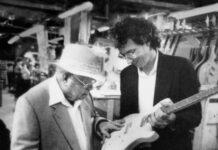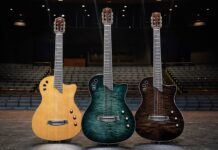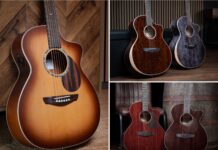
Interview: Bob Taylor on The Ebony Project
We last spoke about sustainability around the time of the V-Class bracing launch in January 2018. How have your projects in Cameroon and Hawaii developed over the last 12 months?
“Cameroon is developing as far as our cutting, work in the forest and importantly, our planting programme, which we call The Ebony Project, goes. Our employees are happy. We’ve developed a few nurseries for growing ebony saplings from seeds, and this year was a very good fruiting year in the Congo Basin, being in huge contrast to the last two years, when there was almost no fruit.
Bob Taylor grading ebony fingerboards with Crelicam employees Emma and Michel“This means that this year, we were able to collect seeds and plant in our nurseries – about 25,000 plants. We’re learning that they must be at least two years old before we can plant in a village. This April, we’ll do our largest planting yet of several-hundred ebonies in a village outside of our city, using the plants we started two years ago, with more planting soon after that in another village. The biological study of the ecology of ebony that we’re doing is coming along and we’ll begin to publish scientific reports soon. So we’re very excited.
(L-R) Crelicam employees Francois, Etunde, Michel, Emini, Mbala and Jeàn“In Hawaii, we’ve purchased our own land of 560 acres, have a reforestry plan written and approved, and have completed the civil engineering for the road system. Work will start in a few months and planting begins towards the end of 2019, an eight-year plant-out totalling more than 100,000 trees, maybe up to 150,000 to start, which will be thinned to lesser numbers as the years go by and the trees increase in size. [We’ve made] huge progress on understanding and making plants. And we’ve been invited in to more private lands to do selective cutting and planting. This project is really going well.”
How do you reconcile the current US administration’s message on the environment with your own conservation efforts and the need for sustainable wood supplies in the guitar industry?
“The winds of governments change to and fro. Meanwhile, the world goes on and we’re planting trees and drawing attention to that example. So in a way, we are doing something about it. It’s inevitable that both opinions will exist at the same time; those who feel the environment is in good condition and those who feel we must do something to stop the decline. I belong to the latter opinion and that guides what I do. I believe that conservation will win out in the end. Hopefully, before the end!”
Sustainably harvested abalone shells from community fishing cooperatives along Mexico’s Baja California peninsulaFor obvious reasons, when people think about sustainability in the guitar industry, wood dominates the conversation. Yet there are many other materials that go into guitar manufacture, whether as a part of the instrument itself or shipping packaging, et cetera. We remember you telling the story of diving for the abalone when you built your first guitars… as we head in 2019, how confident do you think guitar companies can be that materials such as abalone have been ethically or sustainably sourced?
“Funny you mention abalone! Over the last two years, we have been able to help a large Korean company that processes the abalone that makes its way into most of the guitar world, by us being the liaison between them and the well-managed abalone harvest trade in Baja California, Mexico. We have inroads and relationships there and so I’m personally very happy with what I know about that source. It’s very well controlled.
“And in many ways, that’s all we makers can do, is to roll up our sleeves and help people land in the right place to do things right. Some industries like packaging are so vast that no matter what we chose to do it won’t change the good, or bad, habits of that industry, except for being a client of theirs and making our wishes known. In that way, we can have an effect.
Bob Taylor and Dr Zac Tchoundjeu, a leading expert on agroforestry and a key partner in The Ebony Project“And just to mention, over-packaging is a gripe of mine and yet I find myself participating in things I don’t like in that area because it’s not the hill I want to die on quite yet – I don’t have a better answer. But I will say that I’m an optimist and feel that improvements will continue to find their way into the world. Just this week, our city of San Diego banned styrofoam packaging in food-service stores. That dwarfs anything I can do.”
For the sake of the uninitiated, if people reading this take one thing away with them about sustainability in the guitar industry, what would you like it to be?
“Be a conscientious, aware player, even on the day that you buy your own guitar, where you have a chance to put your money where your ideals are. Accept change if you see a maker trying to make those changes for the betterment of the environment. Meanwhile, Taylor will always try to do 99 per cent of that work for you, so you don’t have to settle for less.”
Finally, how do you feel about the new Grand Pacific guitars?
“Well, what can I say? I wrote recently that I have a new grandson and I just love that little boy. He’s not my child, but he is my kid’s child and the feeling is amazing. Andy’s guitars are like that to me, emotionally, it’s all Andy and yet still part me.
“Apart from that emotional feeling, it’s a fine guitar and one I probably would not have been able to make myself. I don’t have that skill, believe it or not, in my ears to consider it needs to be made, or in my understanding of a top and how it can be made. It’s a better guitar than I make, and sets a new bar for us at Taylor.
“I think many players will love it and put it to use and I believe Taylor, through the Grand Pacific, will make another mark in the musical world. I also think that it’s another accomplishment of Andy’s that will continue to build his reputation as being among
the best guitar builders alive.”
Find out more about the team behind The Ebony Project and Bob Taylor’s sustainability projects in Cameroon by visiting taylorguitars.com/ebonyproject.
The post Interview: Bob Taylor on The Ebony Project appeared first on Guitar.com | All Things Guitar.
Source: www.guitar-bass.net










